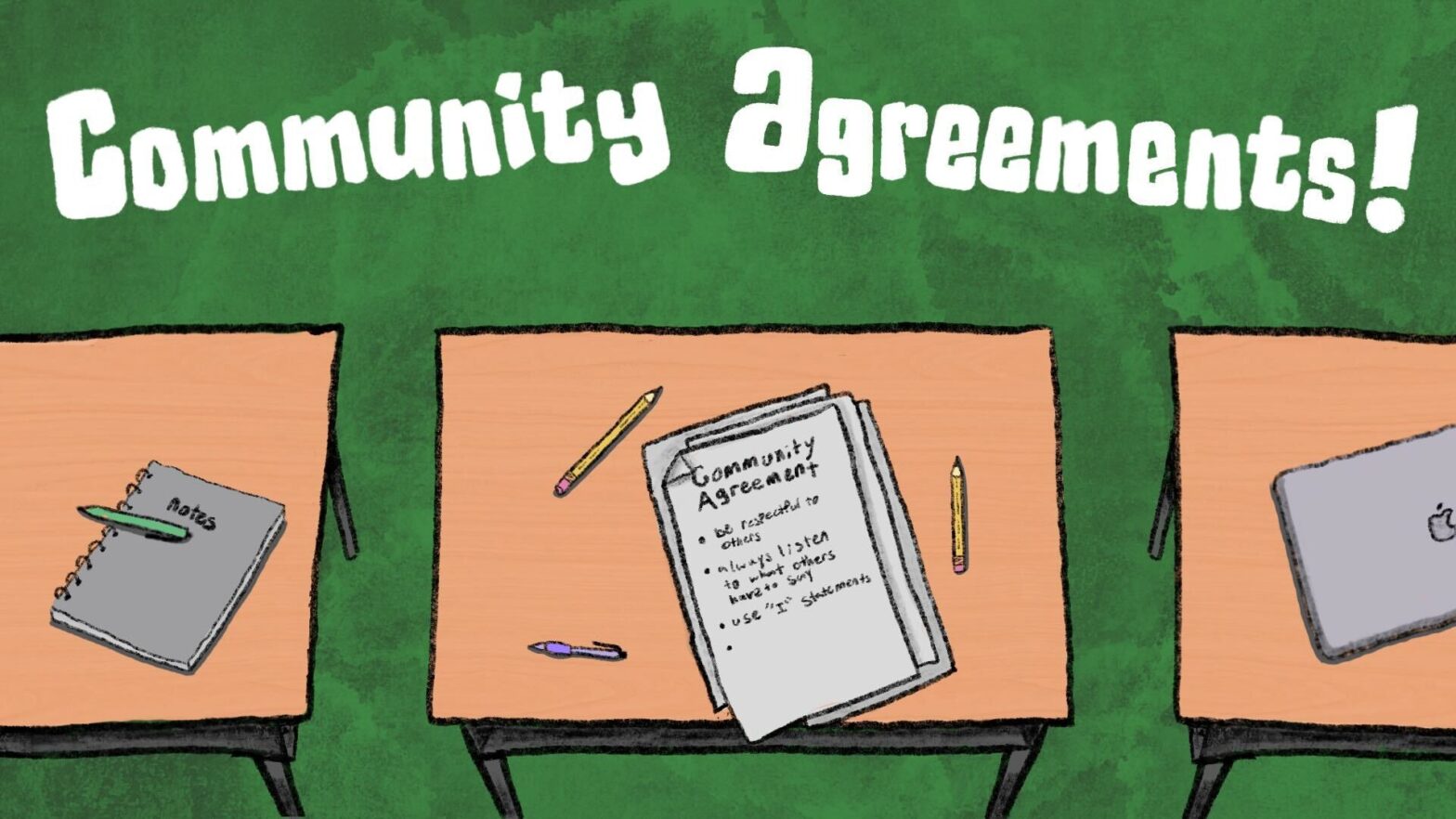Community agreements should not be reserved for kindergarten classrooms so everyone will sit on their bottoms and stop eating the paste. These agreements aim to keep teachers and students accountable for their words and actions — working to maintain the most productive and positive learning environment possible. Sounds like a dream, right?
A considerable number of teachers I’ve had from middle school onward were under the impression that because they were older and in a position of authority, they could disrespect me and my peers and then demand our respect in return.
They were under the wrong impression, and their classrooms were in dire need of community agreements.
So I was surprised, coming to The New School for my graduate studies, that professors were using community agreements in their classes. I was already desensitized to unhealthy classroom communities where I picked up the slack in group projects, took the brunt of neurodivergent insults, and was seen as the teacher’s pet who wouldn’t dare talk back.
I was thoroughly impressed that Part-time Lecturer Andrea Pinkney and Part-time Assistant Professor Caron Levis of the creative writing MFA program not only introduced community agreements during their first classes, but spent subsequent classes discussing, crafting, editing, and reading our agreements. Prioritizing simple ideas like “step up, step back” (giving space for others to speak or challenging yourself to speak more), giving the right to pass or admit discomfort, and valuing all voices makes my learning as a deeply anxious introvert that much easier.
I felt like I had finally arrived; I was a real adult that demanded and was met with respect and compassion. But it shouldn’t have taken this long to feel seen.
Santa Clara University Professor Jesica Sihman Fernández says community agreements “help cultivate critically compassionate student-student and student-teacher interactions.” Agreements achieve this through an affirmative set of values that may include general treatment of others, dealing with conflict, addressing bias, collaborating and participating, challenging viewpoints, setting boundaries, and practicing productive discussion. They are ideally constructed from student input and acknowledge potential amendments and changes.
Unfortunately, community agreements in the classroom are relatively new — and, no, classroom rules do not count. Rules come from the teacher, school, our county and typically change very little from year to year without student input. Community agreements are made in collaboration with students and are unique to each class.
Community agreements may be more widely used in elementary and middle schools because of the growing use of the Responsive Classroom approach, which “is a student-centered, social and emotional learning approach to teaching and discipline … designed to create safe, joyful, and engaging classroom and school communities for both students and teachers.”
But where does that leave high school and college students?
We certainly don’t know everything about interacting with each other in school by the time we’re 12 years old, and teachers, no matter their age, don’t either. We can always learn; we can always grow; we can always adjust and adapt.
Refusing to acknowledge this is foolish.
Maybe that’s why during my undergraduate years, professors got away with poking fun at my anxiety or in high school why active listening and dedicated notetaking were never considered legitimate participation.
High school students certainly don’t always know the best way to engage with each other inside (and truthfully, outside) the classroom. So many new, and at times arbitrary, standards are being thrown at them. With community agreements, Socratic seminars could be competitive but not cutthroat, participation could be expected but not excruciating, and graded assignments could be praised but not public. However, that all depends on the follow through.
Community agreements must move with students from elementary school throughout their academic journey in the classroom. The values promoted recognize the students working up the nerve to raise their hand, the students who always jump into conversation without missing a beat, and the students who are just finding their voice. We all are coming from a different day, every day when we enter a classroom; community agreements honor our perspective, our experience, our participation style, our approach to learning, our current emotional weather. And that truly makes all the difference.
I praise the teachers using community agreements now and sticking by them. You are creating change.
With the growing introduction of mindfulness and sensitivity training on college campuses, instructors in higher education are hopefully warming up to community agreements. And if you do a quick Google search on the subject, mostly university webpages pop up.
There may be some teachers (particularly in high school) that just hate their job that much, where the relationship with their students is the last thing on their minds. To be fair, this may have a great deal to do with the teaching profession and the obscene low pay. If teachers have grown bitter and given up, it may be hard to convince them it’s worth putting in the extra effort.
But don’t call me a snowflake for wanting respect and accountability in education — and in life.
While the follow through on my class community agreements is yet to be seen (I’ll have to give it some time), it gives me hope and more importantly, something to look back on that frames my learning experience.
So teachers, if you’re going through a syllabus week (or day) and addressing housekeeping issues — you have the time for a community agreement. And if you think you don’t, make time.








Leave a Reply